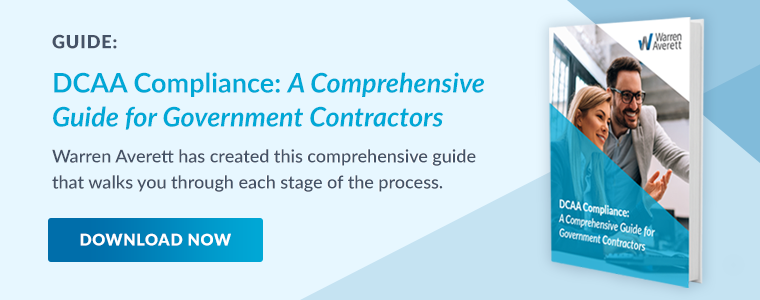What Are the Benefits of DCAA Compliance Consulting?

Working with the government is potentially financially rewarding, but the compliance burdens can be immense. To satisfy DCAA audit requirements, contractors need to have expertise in relevant regulations, skills in setting up various systems and knowledge of the audit process. Just as important is the ability to bring all these skills together for optimal business decisions. It’s a difficult challenge for small contractors, which is why many turn to professionals for help.
Let’s take a closer look at the benefits that DCAA compliance consulting can bring, and when you might consider outsourcing DCAA audit compliance work.
Learning the Rules in Plain Language
DCAA compliance consulting professionals are highly experienced with the rules that apply to government contracting. These mainly come from Generally Accepted Accounting Principles, Federal Acquisitions Regulations and Cost Accounting Standards which tend to be technical and difficult to understand.
Experienced consultants can explain—in plain language—how you should identify costs as either direct, indirect or unallowable. They can talk you through how to track direct costs by contract and assign indirect costs into pools. Furthermore, they can advise you how to calculate indirect rates and ensure unallowable costs are not billed.
They’ll also be well versed in the extensive requirements for timekeeping. These cover the way your system is set up, when and how much time should be recorded, who fills in the timesheet, the authorizations in place and policy documentation. Additionally, there are requirements around your labor distribution process, billing system and monitoring and review procedures.
Understanding Audits
Outsourcing compliance work can also help to take the guesswork out of the audit. There are many types of audits, so whether it’s an Incurred Cost Audit or a Pre-Award Survey, a DCAA compliance consulting professional can point out what the auditor will focus on, including which reports, calculations and reconciliations you’ll need to provide, and the audit trail they’ll expect to see. Consultants know the most common mistakes government contractors make, and they can provide tips on how to avoid them. They can also perform a simulated audit in advance.
Of course, knowing the key areas of scrutiny means you can prepare ahead of the audit by identifying and fixing problems, ultimately boosting your chances of audit success.
Setting Up QuickBooks for Success
While many small government contractors use QuickBooks as their accounting software because it’s affordable and offers flexibility, QuickBooks is not designed to meet FAR requirements straight out-of-the-box. With the help of a professional, you can find the add-on components needed to achieve compliance and set up your Chart of Accounts to demonstrate proper segregation of costs through account sequencing. You can also get input on how to map service or payroll items correctly, and software configuration tips on timekeeping, labor distribution, payroll and ability to track contract funding.
A professional can explain the way transactions flow through your accounting system, how calculations and allocations are done, review your system for oversights, as well as show you the various reports available in QuickBooks. Apart from helping you extract information for auditors more quickly, this type of knowledge can empower you with deeper operational and financial insights for better business decisions.
Improving Business Outcomes
Professional guidance concerning DCAA audit compliance can potentially help to improve the financial viability of your business.
For example, contractors often feel they need to “play it safe” if they’re unsure of how a particular cost should be allocated. They treat all costs that fall into a grey area, such as advertising and public relations, as unallowable. However, there are instances when these costs are allowed. By not claiming them, you’ll underestimate your indirect rates and miss out on recouping them from the government, which will negatively impact your bottom line.
When to Consider Outsourcing Compliance Work
With such a diverse range of systems and processes involved, smaller organizations often struggle to have staff with sufficient time and expertise to cover all these areas. Employing a CFO or a controller is unaffordable, and there often isn’t a budget to offer such specialized training for staff either.
Some business owners may also prefer focusing on the business itself, rather than accounting accuracies, and encouraging employees to do the same. But when you leave systems and processes unchecked in a highly regulated business environment, mistakes of all kinds—involving cost allocation, indirect rates, timekeeping or billing—can happen. This could result in poor business performance and decisions, failed audits, losing out on future contracts, delayed payments and fines.
It may be time to consider outsourcing DCAA compliance if:
- Your business lacks staff with appropriate expertise in one or more key audit areas;
- You’re concerned that you may not be following the regulations fully;
- You’re unfamiliar with DCAA audits;
- You want the audit to be completed efficiently in as little time as possible;
- You’re having trouble making QuickBooks work for you—for example, you’re unable to reconcile reports from one system to another, and/or you can’t perform an audit trail of transactions or records;
- You want staff to maximize the time they spend on the business itself; and
- You would like a review of your indirect rates to ensure accurate pricing and workable contract terms.
Learn More about DCAA Compliance Consulting
Remember, accounting is an allowable expense for federal government contracting, so getting help from a DCAA compliance consulting professional can be an especially cost-effective solution. If you are looking to hire a specialist in this field, Warren Averett can help. Our team of GovCon experts have years of industry knowledge and experience. We can work with you to build DCAA compliant systems and identify potential issues before an audit begins.

